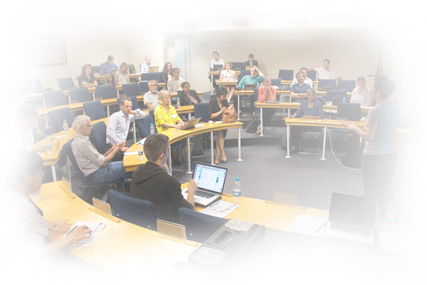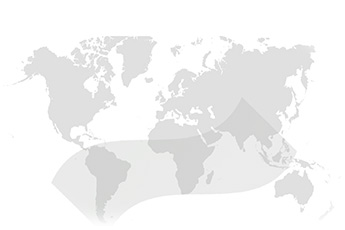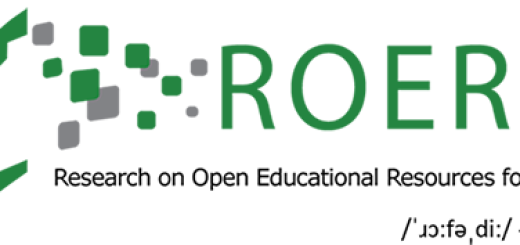Image provided under a CC BY licence.
At the recent OER18 conference in Bristol, UK, and the Open Education Global conference in Delft, Holland, ROER4D researchers discussed their OER work with the broader open education community. Much of what they shared was the culmination of the four years of engagement with the ROER4D programme and the OER research projects that they pursued through it.
As one of the ROER4D members fortunate enough to attend the conference, I found it a joy to connect with colleagues, learn more about the trends shaping OER research and showcase some of the work that made ROER4D unique. In this post, I offer my thoughts on what made these conferences memorable, highlighting some of the ways that ROER4D’s work was received and recognized.
OER18 – Bristol, England
OER18 was held at the vibey Watershed in bustling Bristol. A lovely riverine city, it was the perfect location for the UK’s premier OER event, co-chaired by open luminaries Vivien Rolfe and David Kernohan. Glenda Cox and I – both ROER4D researchers based at the University of Cape Town – attended the conference and gave presentations on our work.
Glenda focused her edited volume (authored by Hodgkinson-Williams, Arinto, Cartmill & King), using Margaret Archer’s social realism as a lens to understand the relationship between structure, culture and agency in OER adoption, and how this shapes individual and institutional volition with regard to OEP. This social realist approach was found to be quite powerful in eliciting critical insights from the broader set of findings emanating from all of the ROER4D sub-projects, allowing them to connect with each other to speak to issues across the Global South.
My presentation concerned the relationship between OER, OEP and social inclusion, suggesting that three types of OEP – OER use “as is”, OER revising/remixing, and OER creation – correspond broadly to three tiers of social inclusion, that of access, participation and empowerment, respectively.
We also showcased ROER4D’s recently published collection of sub-project chapters, the edited volume, chapter summaries. We were pleased to see a high level of interest by the OER18 crowd in ROER4D’s findings.
ROER4D PI Cheryl Hodgkinson-Williams virtually (via #BreakOpen session facilitated by a number of OER pundits, including Sukaina Walji, ROER4D’s Communication consultant until December 2017. Cheryl adopted political philosopher Nancy Fraser’s concept of social justice as “parity of participation” to explain how OER can unwittingly be used in three social unjust ways, namely (1) economic injustice or maldistribution; (2) cultural inequality or misrecognition; (3) political misframing. She raised a concern that despite all the good intentions of the OER movement, her concern was that unless economic, cultural and political dimensions were adequately addressed the value proposition of OER would not be fulfilled in the Global South.
We were lucky enough to attend a number of fascinating presentations, including those by: Beck Pitt, Bea de los Arcos, et al. on the UK Open Textbook pilot, which was highly informative and relevant for our situation and desires in South Africa.
The three keynotes were especially thought-provoking, with David Wiley giving his thoughts on the last two decades of the open movement, especially by what he sees as the debates between the “purists” and “pragmatists” who influence the open agenda in varying ways. In all, OER18 was an excellent conference where the state of open educational research was consolidated and advanced.
OE Global – Delft, The Netherlands
After Bristol, Glenda and I went to the OE Global Conference in delightful Delft. Co-hosted by Willem van Valkenburg, Robert Schuwer and Paul Stacey at the old city’s impressive technical university (TU Delft), we were joined by ROER4D researchers Shironica Karunanayaka from Sri Lanka and Judith Pete from Kenya.
Glenda presented meta-synthesis chapter. The poster offers a useful and succinct approach to understanding the Open Education Cycle and how it relates to issues of structure, culture and agency (the key analytical components of social realism). It shows, as well, how the findings of a complex multi-sited, multi-study research project can be synthesized to produce a broad set of findings that are relevant across a region as massive as the Global South.
I spoke again about the relationship between OER, OEP and social inclusion, but this time elaborated on the political implications of this relationship, setting out some challenging insights regarding the limits of OER and OEP in achieving greater inclusivity. The positive response of the audience to this added analysis suggested that issues of social inclusion and justice will only grow in importance in future OER research.
Shironica gave a presentation on “OER differentiation”. Both presentations were well received, prompting a number of interesting conversations afterwards.
In addition to ROER4D presentations, we enjoyed those of a number of our OER colleagues. Amanda Coolidge and Rajiv Jhangiani spoke about their experiences with OER in British Columbia, suggesting that for OER and OEP to become sustainable, it must be based on collaborative enterprises and communities of practice.
Quite interesting as well was the provocatively titled Virtually Connecting) and physical workshop session where this provocation and three others were intensively debated
It was highly stimulating and will continue as a format for engagement at other conferences including at OpenEd 2018 in Niagara Falls in October 2018.
Lastly, it is worth mentioning that a number of presentations mentioned ROER4D research in their discussions of what they considered “good” OER research emanating from the Global South. Such endorsements let us know that it was clear that the Open Community was aware of ROER4D’s contribution to the field and were keen to engage with the project’s findings. This was very exciting for us.
Open Data Award
The trip to Delft was made even more special by the fact that ROER4D was honoured by the Open Education Consortium with this year’s award on Open Data. Glenda and I gratefully accepted the award on behalf of the ROER4D team, but were especially thinking of all the hard work put in by Michelle Willmers and Thomas King to make the project’s open data efforts so successful. This award was the perfect capstone to a trip so rich and generative regarding OER research and its future.





